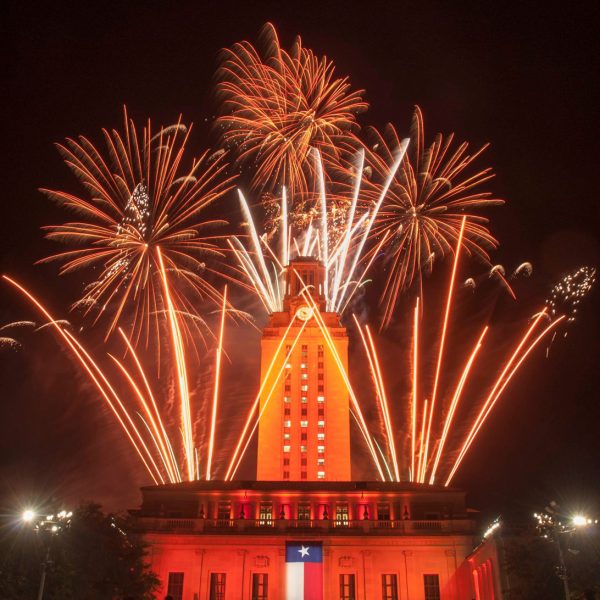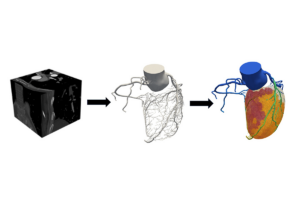Last spring, on March 6, Tricia Berry was pulling into the loading dock of the Engineering Education and Research Center, preparing for the annual educational event Explore UT, when her phone erupted with texts.
“(My colleagues) were saying, ‘It’s been canceled.’ And I have a carload of snacks and supplies for the next day,” Berry, director of the Women in Engineering Program, says. “It quickly became an evening of contacting all of our department leads … trying to make sure they knew.”
Meanwhile, Doug Bolin, associate director for University Events, and colleagues in the University Development Office were communicating with public schools all over the state after university leadership had decided earlier that afternoon to cancel the event.
“Unfortunately, one bus,” Bolin says, “had already arrived from Amarillo to attend Explore UT.”
At the time, neither Bolin nor Berry could have anticipated how long the coronavirus pandemic would last — or that they would soon be planning remote, online events for many months to come.
As the country began to understand the severity of the pandemic, UT’s spring events “were just in a holding pattern,” Bolin says. “And then came commencement.”
Bolin and his colleagues knew they essentially had one option for spring 2020: holding a virtual ceremony, although no one knew at the time what that really meant. Each college and school held a virtual program and created an individualized slide to recognizing each graduate. To mark the occasion of the university-wide ceremony, the University Events team created a live broadcast program that concluded by turning the Tower orange in honor of
the graduates.
But “it wasn’t a very satisfying moment for students to complete their degree,” Bolin says. “They deserved fireworks in front of the Tower.” Thus, an in-person ceremony was planned for later. Currently, the 2020 Reunion Ceremony is scheduled for Sept. 17.
As the pandemic continued, Bolin says he and his colleagues realized they would need to create virtual programs that were more interactive and engaging. “The transition was from saying, ‘What can we do in the meantime?’ to ‘We’re going to have to live with this, and it needs to matter,’” he says.
Throughout the summer, fall and winter of 2020, the traditions of numerous events such as Gone to Texas, Longhorn Halloween and Orange Santa were upheld through this online format. “It was fun to work as a team to be creative and think under those circumstances,” Bolin says.
“It reinforces the value of celebration,” Bolin says. “It’s easy to become jaded and think it’s not worth it, but to a lot of people, it really is.”
This spring, Explore UT was a free, online event held over two days in March with more than 200 online programs. The expansion to two days included one school day, making it “much more accessible to a larger percentage of the population who may not have the resources to come to campus,” Bolin says.
Bolin says he is excited to “encourage people to participate” from where they are, including such far corners of the state as the Panhandle, El Paso and the Rio Grande Valley.
“I can see some elements continuing in the future,” he says, “even though we would go back to an in-person program as well.”
Likewise, Berry also adapted to the new normal with a virtual Girl Day program that ran from late February through early March. She and her colleagues decided to spread the event — which aims to interest more K-12 students in the fields of science, technology, engineering and math — over a longer period of time, so to not overwhelm participants.
The program included online, interactive activities aimed at kindergarten through eighth-graders and featured new components for an older audience.
Berry says she was excited about the expansion of Girl Day this year. “We definitely want to get back to in-person Girl Day,” she says. “But this lets us reach people all over the globe that we’ve never been able to engage before.”
Bolin and others are now making plans for commencement in May. It will likely include both in-person and virtual elements. Each of the colleges and schools plans to hold a socially distanced stage-crossing walk for graduates who wish to participate. This will be livestreamed for those at home.
“We have to make sure that we’re providing an opportunity for families to participate virtually and remotely,” Bolin says.
Additionally, there are plans for a university graduation ceremony to be held at Darrell K Royal-Texas Memorial Stadium. Depending on the number of students who intend to come, graduates might be able to invite a few guests. Everyone in the stadium would be seated at least 6 feet apart.
Knowing things can change, “There are checkpoints,” Bolin says. “We’re still in the middle of a pandemic. March 15 and
April 15 will be touchstones to know all is safe to proceed.”
Bolin says he has been excited to put together such programs. Commencement “is a really wonderful thing,” he says, “and this year is no exception.”
“You want a program to be something that’s meaningful for the participants,” he says. “Whether it’s virtual or in-person, hopefully it has the connection to the institution and to the participant’s experience.”



